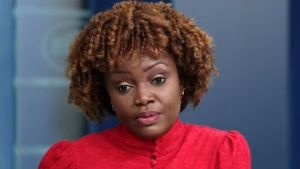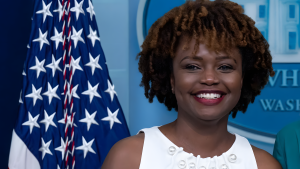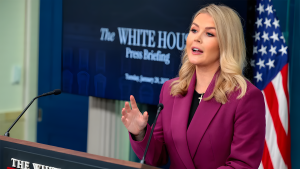Leavitt and Jean-Pierre Face Off in Tense Exchange on The American Pulse

In a high-profile appearance on The American Pulse, hosted by Jake Tapper, former Biden White House Press Secretary Karine Jean-Pierre and current Trump spokesperson Karoline Leavitt engaged in a heated debate that highlighted deep divisions over immigration, the economy, and presidential leadership.
A Highly Anticipated Debate
The discussion featured two political figures from opposite ends of the spectrum. Leavitt, at 27, is among the youngest press secretaries to serve under a presidential candidate, representing Donald Trump. Jean-Pierre, who previously served as press secretary under President Biden, came prepared to defend the administration’s record. What began as a moderated conversation quickly escalated into a contentious exchange.

As Tapper introduced the guests, both candidates received mixed reactions from the live audience, signaling a split viewership reflective of the national political climate.
Sharp Contrasts on Policy and Priorities
Leavitt opened with a strong defense of the Trump administration’s policies, citing achievements in border enforcement, foreign trade, and economic investment. “President Trump has delivered measurable results,” she said, referencing recent immigration enforcement figures and trade negotiations.

Jean-Pierre countered by emphasizing the Biden administration’s efforts to promote equity and human rights. “We’ve worked to balance border security with compassion and fairness,” she said, though she acknowledged challenges in delivering real-time data and managing complex migration patterns.
Throughout the debate, Leavitt pressed hard on issues like inflation, border control, and foreign policy, accusing the Biden administration of failing to maintain public safety and economic stability. Jean-Pierre responded by noting that inflation is a global issue and emphasized the administration’s work on infrastructure and social equity.
Heated Moments and Audience Reaction
The exchange grew increasingly combative. Leavitt frequently challenged Jean-Pierre’s responses, questioning her preparedness and criticizing her for what she characterized as vague answers. Jean-Pierre attempted to refocus on policy, but often found herself on the defensive.
When Jean-Pierre brought up concerns about Trump’s legal and ethical controversies, Leavitt shifted the focus back to job creation and foreign policy, arguing that tangible results should speak louder than media narratives.
The live audience responded strongly to both speakers, with noticeable support for Leavitt’s assertive tone, while Jean-Pierre’s supporters remained relatively quiet during more contentious moments.
Post-Debate Response
Following the debate, reactions on social media were swift and polarized. Hashtags supporting both candidates began trending, but Leavitt appeared to gain broader traction online, with many praising her command of the debate and messaging. Conservative media outlets hailed her performance as a win, while more progressive platforms attempted to contextualize Jean-Pierre’s arguments within broader policy challenges.
Looking Ahead
The debate underscored not only the stark ideological differences between the two camps but also the growing role of media performance in shaping political narratives. Leavitt’s performance has elevated her visibility among conservative voters, while Jean-Pierre’s defense of the Biden administration highlighted the complexity of governing in a polarized era.
In the months ahead, both parties will likely use moments like this to energize their bases. Whether this exchange will shift public opinion remains to be seen, but one thing is clear: the political spotlight is intensifying as the next election approaches.






